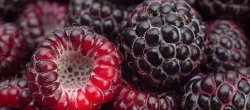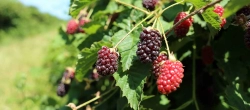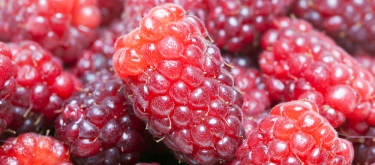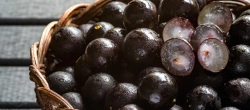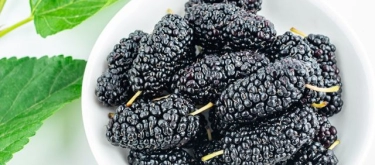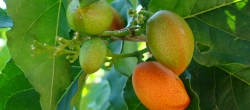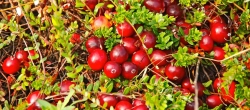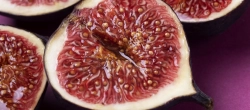Blackberry: Taste, Uses, Benefits and Harm
Blackberries, native to Europe and North America, are dark purple-black berries known for their juicy texture and sweet-tart flavor. These versatile berries are used in both sweet and savory dishes, adding depth and color to desserts, sauces, and salads. With a high antioxidant content and juicy texture, blackberries are a popular choice in various cuisines for both their flavor and health benefits.
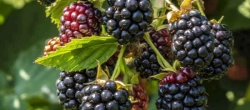
Primary Flavor Characteristics
Blackberries have a bold, sweet-tart flavor with earthy and slightly floral undertones. The balance between sweetness and tartness makes them refreshing and complex, enhancing both sweet treats and savory recipes. The level of tartness can vary depending on ripeness, with fully ripe blackberries offering a sweeter taste.
Aromatic and Taste Nuances
Blackberries have a fruity, slightly floral aroma that complements their complex taste. The flavor is juicy and rich, combining a subtle sweetness with an earthy depth, giving them a distinctive, slightly musky aftertaste.
Scientific Description of Taste and Aroma
- Aroma: Fruity, earthy, with mild floral notes.
- Taste: Sweet-tart with earthy undertones and a mild floral hint.
- Texture: Juicy, with a slightly firm structure and tiny seeds.
In-Depth Flavor Analysis of Blackberry
Underlying Flavor Notes
Blackberries have a nuanced flavor profile with layered notes:
- Sweetness: The natural sugars give blackberries a mild sweetness, particularly when fully ripe.
- Tangy Acidity: The tartness adds brightness and balances the sweetness, making them refreshing.
- Earthy Undertones: A faint earthiness provides depth, especially in wild varieties.
- Floral Hints: Subtle floral notes enhance the berry’s fresh, vibrant character.
Impact of Ripeness on Flavor
- Unripe Blackberry: Firm texture with a pronounced tartness and less sweetness.
- Ripe Blackberry: Juicy, soft, with a balanced sweet-tart flavor and enhanced earthy notes.
- Overripe Blackberry: Very soft and intensely sweet, best used in sauces or preserves.
Textural Qualities
Blackberries are juicy and slightly firm, with tiny edible seeds that add texture. When fully ripe, they become tender and melt in the mouth, making them ideal for both fresh and cooked applications.
Culinary Uses of Blackberry
Primary Uses
- Fresh Eating: Blackberries are enjoyed fresh, adding a burst of flavor to fruit salads or eaten as a snack.
- Desserts and Baking: Blackberries are used in pies, tarts, crumbles, and cakes for their sweet-tart flavor and dark color.
- Jams and Preserves: The high pectin content in blackberries makes them ideal for homemade jams and preserves.
- Smoothies and Beverages: Blackberries add a deep, fruity note to smoothies, juices, and cocktails.
- Savory Sauces: Blackberries are often used in sauces for meats, where their acidity balances rich flavors.
Ideal Pairings for Blackberry
- Chocolate: Dark chocolate complements blackberries’ tart sweetness in desserts.
- Citrus Fruits: Lemon and orange enhance blackberry’s natural acidity and brightness.
- Herbs: Mint and basil add freshness, balancing blackberries’ earthy undertones in salads and drinks.
- Vanilla: Vanilla’s smoothness rounds out blackberries’ tartness, creating a harmonious flavor in desserts.
- Cheese: Soft cheeses like brie or goat cheese pair well with blackberries in salads or appetizers.
Health Benefits of Blackberry
Key Nutrients and Benefits
- High in Antioxidants: Blackberries contain powerful antioxidants, including vitamin C and anthocyanins, which help protect cells from damage.
- Dietary Fiber: The fiber content in blackberries supports digestion, heart health, and blood sugar regulation.
- Low-Calorie and Nutrient-Dense: Blackberries are low in calories, making them a nutritious addition to a balanced diet.
- Vitamins and Minerals: Blackberries provide essential vitamins, like vitamin C and K, and minerals such as manganese and magnesium.
- Supports Brain Health: Some studies suggest that antioxidants in blackberries may support cognitive function and brain health.
Potential Precautions
- Seed Sensitivity: Some people may find the small seeds in blackberries difficult to digest.
- Natural Sugars: Although blackberries are low in sugar, moderate consumption is advised for those monitoring blood sugar.
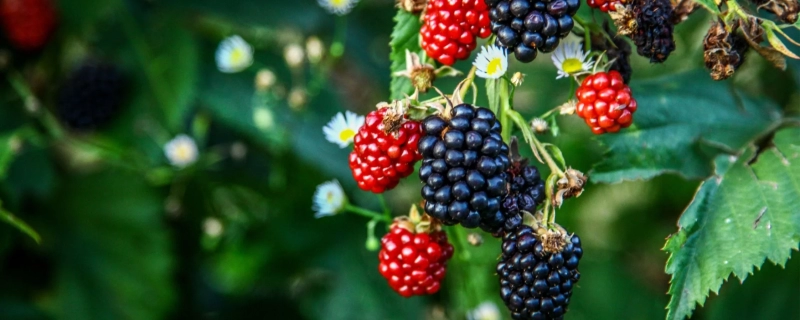
Tips for Choosing and Storing Blackberry
How to Choose Quality Blackberries
- Color and Firmness: Look for plump, deep purple-black blackberries that are firm but yield slightly to touch.
- Aroma: Fresh blackberries have a fruity, earthy aroma; avoid berries that appear mushy or have an off smell.
Storage Recommendations
- Refrigeration: Store blackberries in the refrigerator and consume within a few days for optimal freshness.
- Freezing: Blackberries can be frozen for longer storage, making them suitable for smoothies or baking.
Fun Facts About Blackberry
- Ancient History: Blackberries have been enjoyed since ancient times and were used in traditional medicine for their health benefits.
- Rich in Anthocyanins: The dark color of blackberries is due to anthocyanins, antioxidants that may help reduce inflammation.
- Wild Varieties: Blackberries grow wild in many regions, often found along hedgerows, providing unique flavors and characteristics.
Resources
Books and Publications for Further Reading:
- "The Berry Grower: Inspiring Passionate Farmers" by Blake Cothron
– A guide to sustainable berry cultivation, including blackberries. - "The Fruit Gardener's Bible" by Lewis Hill and Leonard Perry
– Comprehensive advice on growing and harvesting blackberries. - "On Food and Cooking: The Science and Lore of the Kitchen" by Harold McGee
– Explores the chemistry and culinary potential of berries. - "Wild Berries of the West" by Betty B. Derig and Margaret C. Fuller
– Features the history and uses of wild blackberries.
